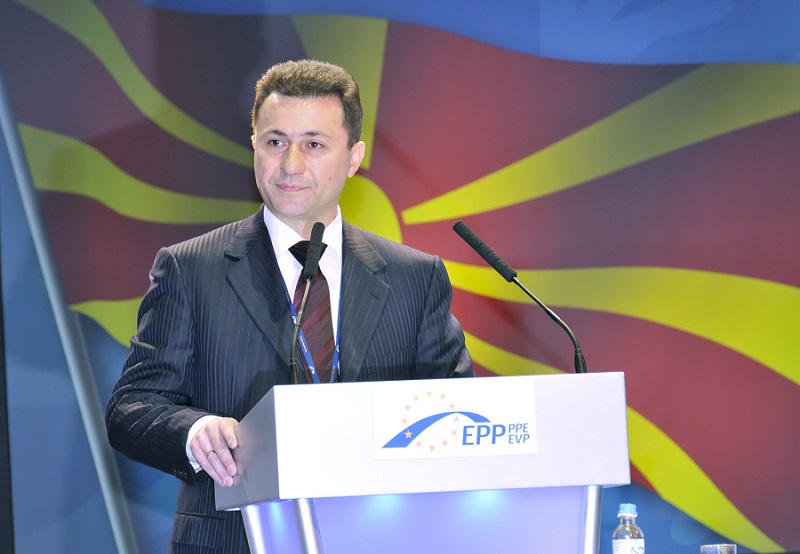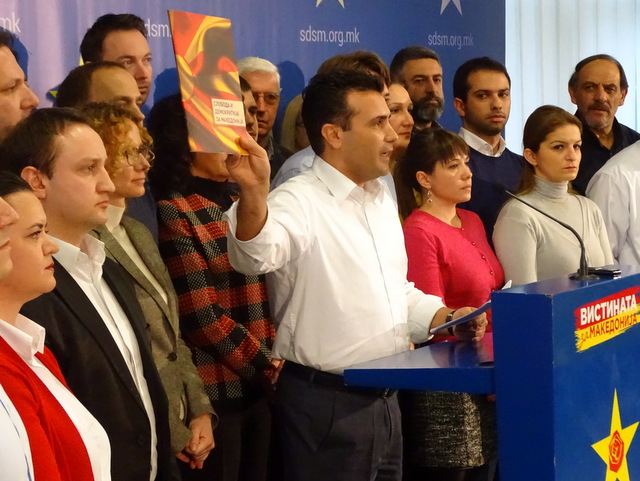 Macedonian PM Gruevski has been accused of large-scale wire-tapping by opposition leader Zoran Zaev, triggering a scandal that has shaken the country. Nenad Markovikj goes through the events that led to the publication of the ‘bombshell’. Macedonian society is increasingly polarised: ‘In one parallel political universe Zaev is a traitor whose only goal is to precipitate the disintegration of the country; the opposing universe sees Zaev as the only hope for Macedonian democracy’. Markovikj also points at the influence of an external actor that has been largely overlooked so far: Russia.
Macedonian PM Gruevski has been accused of large-scale wire-tapping by opposition leader Zoran Zaev, triggering a scandal that has shaken the country. Nenad Markovikj goes through the events that led to the publication of the ‘bombshell’. Macedonian society is increasingly polarised: ‘In one parallel political universe Zaev is a traitor whose only goal is to precipitate the disintegration of the country; the opposing universe sees Zaev as the only hope for Macedonian democracy’. Markovikj also points at the influence of an external actor that has been largely overlooked so far: Russia.

Revolutions usually start with violence aimed at the institutions. The Macedonian coup started at a press conference. On January 31st 2015, at a public press conference, the Macedonian Prime minister Nikola Gruevski accused the leader of the biggest opposition party, Zoran Zaev, of attempting a coup d’état by blackmailing him with recorded material allegedly provided by a foreign intelligence agency. The recordings, whose content started to be revealed on Monday, 9 February, are supposed to contain material that could compromise the government and the leading political parties (VMRO-DPMNE and DUI) and include audio material of high officials involved in criminal activities. The speculations leading to the revelations encompassed a wide variety of claims: from electoral fraud, to pressures on the judiciary by high officials of the government, to events related to the fatal car crash of Macedonian journalist Nikola Mladenov and to one of the country’s biggest tragedies since 2001 – the murder of five people at the Smilkovci lake in April 2012. The golden rule of public opinion had once again been proven: the less facts at our disposal, the wilder our imagination.
The turn of events
The most recent political crisis in the Republic of Macedonia did not in fact start with Gruevski’s press conference. The possession of recorded audio material by the opposition was announced last year. Between September and November 2014, as the Prime Minister publicly revealed, Gruevski met with Zoran Zaev several times, during which meetings the leader of the opposition allegedly tried to blackmail the Prime Minister into forming a technical government, a political goal that the opposition Social-democrats have been trying to achieve for some time now, given that they have been boycotting the Parliament ever since the last parliamentary elections in April 2014 that they convincingly lost.
The culmination of the political crises around the controversial audio materials colloquially known as “the Bomb” started with the arrest of a former high-ranking intelligence officer from the times of the Social-Democratic led government, Zoran Verusevski. On January 23rd 2015 Verusevski was arrested under suspicion of possessing illegal weapons and even child pornography, although the latter indictment was later transferred to his son. At the same time, it became clear that the case has very little to do with either charge, taking into consideration what followed. Besides Verusevski and his wife, two additional people were indicted of espionage, one of them being Zaev himself. Zaev was not arrested, but passport was taken as a guarantee that he will not leave the county.
The public initially concluded that it was Verusevski himself who had leaked the material to Zaev, given his authority and position in the intelligence system in Macedonia. After Gruevski’s press-conference, however, things rapidly became confusing. Namely, on February 2nd a video appeared on YouTube from the Prime Minister’s office, in which Zaev and Gruevski discuss the controversial material, and in which Zaev is seen as stating that he had obtained the material through foreign intelligence agencies.
Such a controversial and sensitive scenario requires an analysis from several standpoints.
Security breach or act of patriotism?
A first, obvious contradiction in the case. If the materials were acquired through foreign intelligence agencies than why was Verusevski arrested at all? If not, then they must have been obtained through internal sources within the Macedonian intelligence community. Both imply a serious security breach of the Macedonian intelligence system, something that further implicates the officials in charge of the intelligence system itself. Such a serious crack in the political dam of the governing structure might seriously damage the regime, especially in times where the government made seriously unpopular moves in the area of higher education, fiscal policy and worker’s rights (strike rights predominantly), all the result of a major increase of state control in all these areas.
Things were additionally complicated when Zaev changed his statement by claiming to have obtained the materials through patriotic intelligence elements within the system, elements that could not tolerate the wrongdoings of the government any more. This seriously shook the credibility of the opposition leader, unless this is understood as a PR strategy of confusing one’s political opponent, given that the collateral has been the complete confusion of the general public as well.
A legal controversy
The second important aspect is a controversy of a legal nature. Namely, on February 3rd 2015, the Public Prosecutor’s office issued a warning that the publication of any material that could become a subject of a legal investigation is considered a crime and is punishable under Macedonian law. It is hardly a competency of the Public Prosecutor’s office to issue warnings regarding completely unspecified audio materials about which a part of the public still wondered whether they existed at all, or questioned the seriousness of their content to say the least.
Another question arises: is collaboration with foreign intelligence services a criminal act? If yes, does it become so only when foreign intelligence material is published, or is obtaining this information a crime in and of itself?
To complicate matters further, every citizen has the obligation under law to report any controversial materials that might imply a crime, as legal experts have pointed out. Aside the legal aspects, it was obviously unimaginable that the opposition leader would have pulled out of revealing the material, as it would have equalled a political suicide in a game with such high stakes.

Parallel worlds
What really made this political game so heated is not just the alleged seriousness of the material in Zaev’s possession. It is also the two parallel discourses formed around the issue that have completely polarized Macedonian society. In one parallel political universe Zaev is a traitor, a collaborator with foreign intelligence services whose only goal is to precipitate the disintegration of the country. The accompanying elements of this political setup are also groups of citizens publicly concerned for the future of their country, some of them even asking for a public lynching or expulsion of the opposition leader from the country. The opposing political universe sees Zaev as the only hope for Macedonian democracy, the light at the end of the tunnel, a therapy for the rapid democratic free fall of Macedonian society ever since the conservatives gained power in 2006. The only connecting point of the two political energies is the increased curiosity to see what else “the Bomb” contains, and maybe the common perception that the country after its publication can hardly remain the same.
International community – a new meaning?
No major political crisis in Macedonia has ever been solved without the involvement of the international community, intended mainly as the EU and the USA. On the one hand, this political interference has managed to out-scale any political crises from the conflict 2001 onwards; and on the other hand it has created a political minefield consisting of precedents. Political analysts easily predicted that the EU would warn the Government with regard to the presumption of innocence and balanced media coverage (or the lack of it), and that the USA would solidify this position by warning the media not to withdraw under political pressure, but nobody expected a third actor to enter the scene: Russia. Unexpectedly, the Russian Embassy issued a statement of support to the Macedonian government in their efforts to protect its constitutional system and prevent any attempt at a coup d’état in the country.
The Macedonian precedent of an active Russian foreign policy in the region reflects recent concerns on Russian efforts to get more politically involved in this specific part of Europe. This has been made much easier bearing in mind the inability of the EU to act on the name dispute of Macedonia with Greece. Such a political stalemate has led to a slow but steady decrease of the legitimacy of the EU as an actor (marginally reflected in the public support for accession) on the local political scene, which leaves vast space for the involvement of external actors that have not been recognized as highly interested in the domestic political scenario up to this point.
Alea iacta est
Regardless of the outcome of this political crisis, the Central Committee of the Social-Democratic Union of Macedonia on February 6th supported its leader Zoran Zaev, in the effort to publish parts of the recordings starting from Monday. This point of no return has only one unknown: will the opposition return to the Parliament – and will Parliamentary immunity be used to publish further compromising material?
There is only one widely shared consensus that seems to unite public opinion in the country: an even harsher clash of the government and the opposition will bring nothing good. In a scenario involving a never-ending name dispute with Greece, constantly decreasing democratic standards (media freedom, the judiciary and the rule of law being the first ones in line), and the complete polarization of public opinion as well as the obvious lack of political dialogue, this would be the least desired way of solving the crisis. If this should happen, the winner is unpredictable but the loser is certain. All political forces in favour of Macedonia’s EU accession will see their cards weakened to the benefit of those who oppose it.
Note: This article gives the views of the author, and not the position of LSEE Research on South Eastern Europe, nor of the London School of Economics.
_________________________________
Nenad Markovikj, PhD, is an assistant professor at the political science department of the Law Faculty “Justinian I” – “Ss. Cyril and Methodius” University in Skopje, Republic of Macedonia. He is also a researcher and one of the founders of one of the most prominent think-tanks in Skopje, the Institute for Democracy “Societas Civilis” – Skopje (IDSCS).


